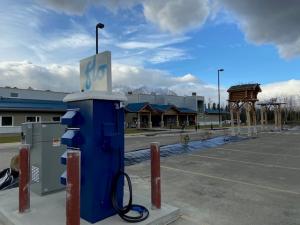
The Government of Yukon has installed two new Level 3 electric vehicle charging stations in Haines Junction and Marsh Lake. These fast-chargers join three others located in Whitehorse and Carcross and are available for public use.
The chargers are also part of a study on how electric vehicles operate in a cold climate. Data gathered is helping governments understand how the electric vehicle travel range and charging efficiency vary throughout the year. The lessons learned in this project will be beneficial to all northern regions of Canada. The Government of Canada and the Government of Yukon are contributing a total of $676,500 in funding for the three-year study. Other project partners include Champagne and Aishihik First Nations, Carcross/Tagish First Nation, Yukon University, Northern Vision Development, Yukonstruct and ATCO Electric Yukon.
Installing fast chargers for electric vehicles is a Government of Yukon commitment under Our Clean Future: A Yukon strategy for climate change, energy and a green economy. Yukon has gone from three publicly accessible electric vehicle chargers in 2018 to 16 now located throughout the territory.
We are providing greener options for Canadians to drive where they need to go. This is part of how we get to net-zero by 2050.
Canada’s Minister of Natural Resources Seamus O’Regan
These new electric vehicle chargers will make it easier and more affordable for Yukoners to choose zero-emission vehicles, while helping to improve air quality and cutting greenhouse gas emissions.
Member of Parliament for Yukon Larry Bagnell
Under Our Clean Future, the Government of Yukon is investing in green infrastructure and supporting electric technology that cuts climate pollution and remains effective in Yukon’s cold climate. Ultimately, our goal is to install fast-charging stations across Yukon so that by 2027 it is possible to travel between all of Yukon’s road-accessible communities with an electric vehicle, through an electrified transportation network.
Minister of Energy, Mines and Resources Ranj Pillai
Stewardship of Däkeyí (our country), and the land, water and animals, is one of our First Nation’s highest priorities. The new charging station at Da Kų makes it possible for community members and visitors to make good choices to reduce their emissions. We are glad to be a partner on this important study, and to have the first electrical vehicle charger in Dakwäkäda (Haines Junction) located at our cultural centre.
Champagne and Aishihik First Nations Kaaxnox, Dän nätthe äda (Chief Steve Smith)
Natural Resources Canada’s Electric Vehicle Infrastructure Demonstration program invested $376,500 with the Government of Yukon adding $300,000 in funding.
The new chargers are located in the Army Beach water treatment plant in Marsh Lake and at the Da Kų Culture Centre in Haines Junction. The three fast-chargers installed in 2019 are at the Yukon Visitor Information Centre, the Yukon Center Mall in Whitehorse and at the Carcross/Tagish First Nation Learning Centre in Carcross.
Types of charging stations include: Level 1 is a common household outlet (120 volts) and charges a vehicle overnight; Level 2 is similar to a household outlet for ranges or clothes dryers (240 volts) and charges a vehicle in a few hours; and Level 3 (fast chargers) charges a vehicle in 30 minutes (480 volts).
Matthew Cameron
Cabinet Communications
867-393-7139
matthew.cameron@gov.yk.ca
Brigitte Parker
Communications, Energy, Mines and Resources
867-667-3183
brigitte.parker@gov.yk.ca
Amy McKinnon
Strategic Communications Manager, Champagne and Aishihik First Nations
867-332-1973
almckinnon@cafn.ca
Alexandre Deslongchamps
Director of Communications, Office of the Minister of Natural Resources
343-292-6837
alexandre.deslongchamps@canada.ca
Media Relations, Natural Resources Canada
343-292-6100
NRCan.media_relations-media_relations.RNCan@canada.ca